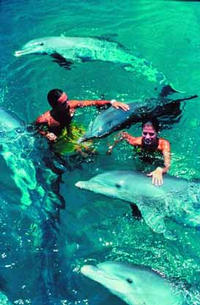| Life Forms in Evolution | 2002-12-27 23:59 3 comments |
 by Flemming Funch by Flemming FunchEvolution on this planet has gone through many steps towards developing gradually more complex creatures. There seems to be a fractal nature to evolution, where for example stages that microbes pass through in a small scale are later repeated at higher levels of complexity. Young life forms will often irresponsibly try to use up all available resources, and will act aggressively against their neighbors, but later on in the cycle, as they become more mature, the various players will negotiate mutually beneficial arrangements amongst each other. The microbes are in many ways ahead of us complex humans in terms of figuring out how different kinds of beings can live together in peace, to everybody's mutual benefit. Even the most small and simple single celled organisms, bacteria, classified as monera, specialized themselves in amazing ways and organized themselves into complex social structures where they were supporting each other's existence. They specialized in breaking down different kinds of chemicals, and other bacteria would start using the chemicals the first produced, etc., forming a complete ecosystem. That was 1.7-3.7 billion years ago. These organisms then moved on to a higher level of cooperation. Multiple different kinds of creatures together formed a cell. These cells, which formed another kingdom called protista, were around a thousand times bigger than the monera. They were still single-celled, but we could say that they are multi-creatured, because they combine many previously separate creatures into one unit. The protists, large multi-creatured cells, further evolved. At first they were prokariotes (before nucleus) and then they developed into eukariotes (cells with a nucleus). Eukariotes are now around a thousand times bigger than the prokariotes. Essentially they are very complex bacterial cooperatives, in many ways as complex as human cities, containing millions of specialized parts that would have been independent life forms in previous evolutionary steps. The nucleus of the cell is the information center, containing a DNA blueprint of how things are arranged. Next step is that multiple nucleated cells combine into multi-celled creatures. And on and on to more and more complex multi-celled creatures, with more and more different specialized parts. Along the way death is invented, to make it easier to improve on the designs along the way, while recycling the old models. Now, billions of years later, we humans have developed reflective intelligence, so we have the luxury of being able to sit and think about these things. But we are also rather ignorant about the complex social order that adds up to our existence. And we tend to be rather arrogant about it, even thinking that all these tiny creatures are nothing but a nuissance to us. Not realizing that our own bodies are amazingly complex cooperative organizations of billions of cells that each are complex organizations of millions of smaller specialized creatures. And all of it is pretty much working in perfect unison. And we humans tend to be so naive that we think that our conscious awareness is somehow in control of all of this, despite that we hardly understand it, and we mostly are totally unconscious of it. Anyway, a question is what comes next, beyond us humans maturing into figuring out how we all can co-exist on the same planet. One quite logical thought would be that we all will arrange ourselves as components of a bigger organism of a higher order. That we'll be cells in the global brain, so to speak, and that humanity maybe will become conscious as a whole. Or, maybe other, more unexpected things will happen. Maybe parts of each of us will start cooperating with each other, and new kinds of life forms will emerge. I'm no biologist. Better places to study some of this would be, for example the book Earth Dance - Living Systems in Evolution by Elisabet Sahtouris. |